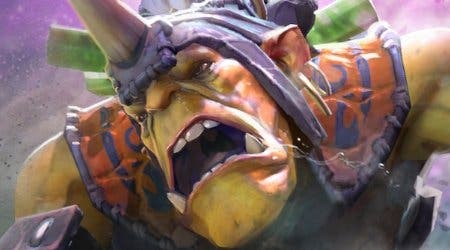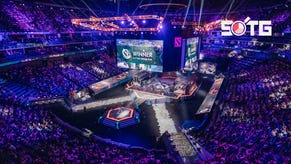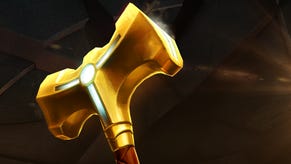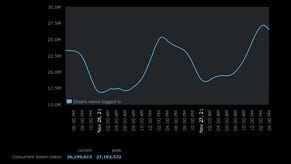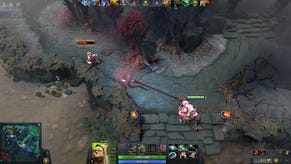Dota 2 Beta Preview
Changing lanes?
I must be going soft, or I must be getting old. Perhaps both. Maybe I've become pulpy and aged, like an over-ripe fruit that's due for the bin, because the Dota 2 beta is punishing me.
It may well be that I've spent far too long amongst the warm comforts of its accommodating and enormously successful peer League of Legends, with that game's gentle tutorials, helpful replays and precisely-tuned player matchmaking. Side by side, a game of LoL now seems like a finely-honed fencing match where opponents parry and riposte, while Dota 2 is an unforgiving broadsword duel in which one false move spells disfigurement or even death.
What's more, while opposing LoL players may give knowing winks as they feint and strike, more than a few Dota 2 players practically spit in each other's faces. Like the original Dota, Valve's Source Engine update has no sense of sympathy. That's not what you play it for. Nor is it what you expect from the remake of a game whose beginner's guide is simply titled "Welcome to Dota. You suck." Highlights include a section on "DISGUSTINGLY COMMON NOOB ITEM MISTAKES," you disgusting new person, you.
If you're not yet familiar with the mechanics of Dota and its derivatives, here's the pithy primer I've learned to recite: two small teams of players control powerful heroes who swing the balance of an otherwise AI-controlled battle of attrition. As both sides meet to duke it out, the heroes pick off enemy units and, if they can, enemy heroes too, helping their armies gradually advance into their opponent's base in a quasi-RTS style.
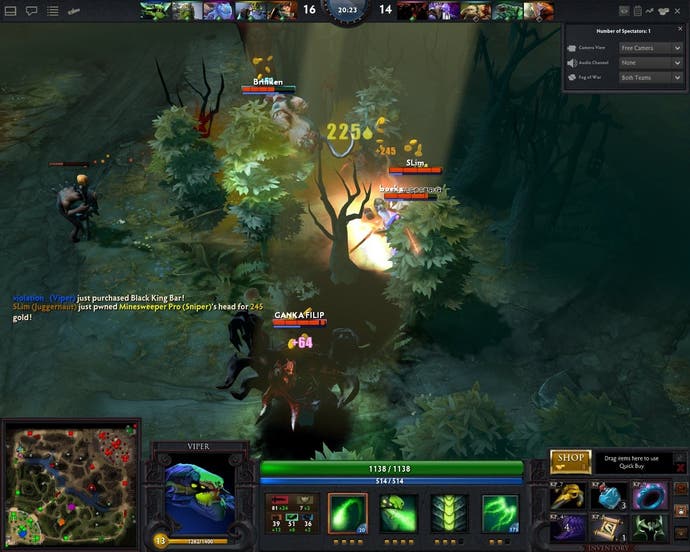
RPG elements are provided by the advancement of your hero, as well as collecting currency and spending this on battlefield bling. Oh, and in the case of Dota itself, climbing the learning curve is comparable to running headlong into the base of a cliff, hence why derivatives such as League of Legends have emphasised accessibility.
But after LoL, Heroes of Newerth and Demigod have riffed on the Dota theme, we've come full circle and Valve is now rushing to release Dota in its new, shinier incarnation. While there are a great deal of cosmetic changes and a few welcome interface tweaks (including, thank God, the collapsing of all the different item shops into one cleaner and more intuitive interface), this is otherwise an extremely faithful update, translating many of the same mechanics, items and characters. If you had a favourite Dota character or item, chances are you'll either already find it in Dota 2 or it's well on its way. So far, this game is much more about production values than about making serious alterations to its predecessor.
"A game of League of Legends now seems like a finely-honed fencing match where opponents parry and riposte, while Dota 2 is an unforgiving broadsword duel in which one false move spells disfigurement or even death."
Of course, the game engine is a massive improvement upon the wrinkled looks of the Warcraft 3-based original. Vibrant lightning arcs from the fingertips of vindictive spellcasters, while fireballs impact the bulging hide of a lumbering ogre as it splashes its way through a filthy, rippling, shin-deep ditch.
Less impressive are the audio histrionics, which are all about grand drama and whooping soundtracks. The emphatic declaration that I have been matched with nine other players and should prepare to enter a game is underscored with an enormous orchestral boom and, sadly, often followed by the news that one of those players has just dropped out and the game is trying to find us all a replacement. Cue further booms and re-matching attempts. And don't even get me started on the hammy, pun-filled voice acting - and, thanks to this being a beta, I don't seem to be able to turn it off.
Still, everything is fairly smooth and glitch-free. The shop interface could still do with a few tweaks and a strange lag bug that Wesley first reported still seems to crop up, but on the whole this is one of the most polished and professional betas I've played in a long time. But there's another problem.
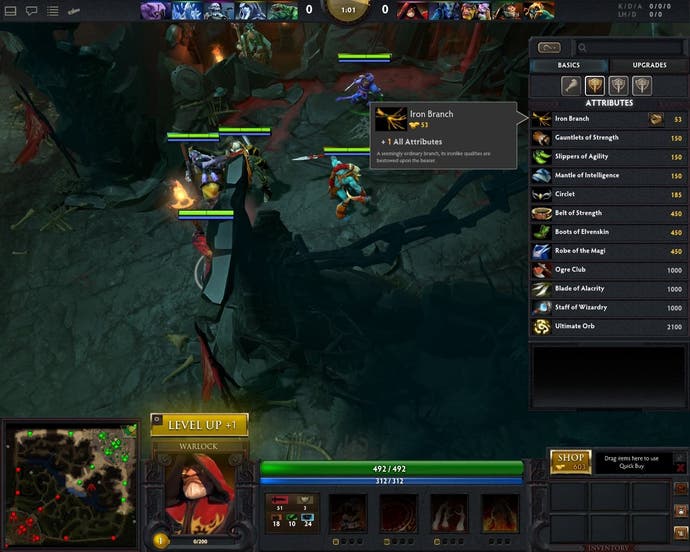
It's about nine hours into the beta that I find myself at something of an impasse. I'm essentially playing a prettier version of the same single map, character-based strategy I've played many times over. But in the claustrophobic atmosphere of a tightly-closed beta, Dota 2 isn't yet able to be all that it claims it can be. There's a limit to the number of players I can be matched with, and many beta testers are Dota diehards - something I am not.
No doubt inspired by the runaway community success of League of Legends, Valve has emphasised how much community will also be an important part of this re-release and the key to a broader player base and wider appeal. But it's not yet possible to see how this has been realised, and most of these elements are not yet functioning. In the meantime, it's a free-for-all involving what Dota's own community calls "the most bad mannered, whining, assholes on the gaming internet."
This is an important point to note. I can think of few other games that are defined as much by those who play them as by any game concepts themselves. League of Legends has worked hard to promote accessibility, to foster a community spirit, to build a dialogue with and between its players and to emphasise good conduct through its peer-led Tribunal system.
This has been a concerted effort to move away from the complexity and hostility that new Dota players have been greeted with (and for an example of the former, check out a typical character breakdown on the Dota strategy website, something that looks more like maths homework than a game guide, while more than a few anecdotes about the latter can be found among the comments on my previous introduction to Dota). Valve did a fine job of invigorating the Team Fortress 2 community and Dota 2's interface speaks volumes for the potential for doing this once again, with the ability to uprate or berate other players, many spectating options and a greater focus on teamplay.
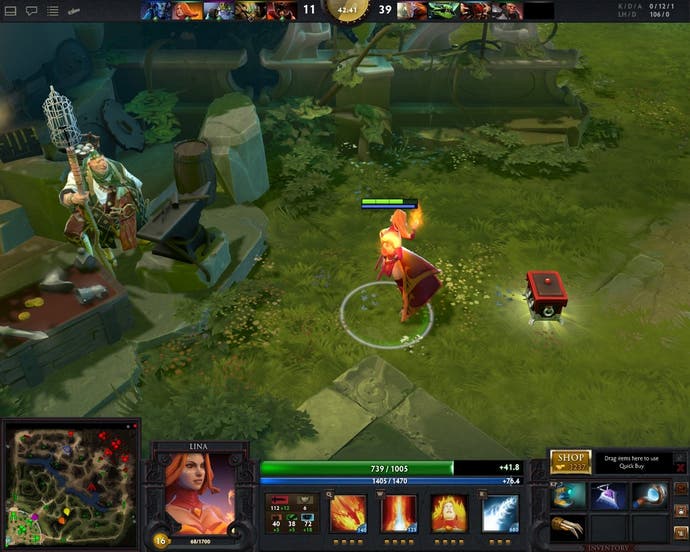
"The beta is a free-for-all involving what Dota's own community calls 'the most bad mannered, whining, assholes on the gaming internet.'"
But, in the meantime, as well as inheriting its predecessor's mechanics, Dota 2 has also inherited its mentality. For now, it remains difficult, even esoteric, precisely-balanced and very unforgiving in both its playing and also in those playing it.
This is somewhat understandable as a hapless player not only has a bad time themselves, but potentially ruins the game for their whole team, pitching them towards a slow and languid demise that may well be drawn out over thirty, forty or even sixty minutes. I doubt there is anyone on the beta right now who doesn't wish for the implementation of a surrender feature, rather than having to suffer another drawn-out and irreversible defeat.
Dota players have traditionally had to be thick-skinned. During a weekend of poor play I'm constantly berated for not noticing things, for picking "bad" items, or "bad" characters, for listening to the wrong players or for not understanding all the slang or shorthand, even though I understand how my teammate was "farming creeps, before pushing mid to take the rax until the other team's carry went MIA and ganked two of us."
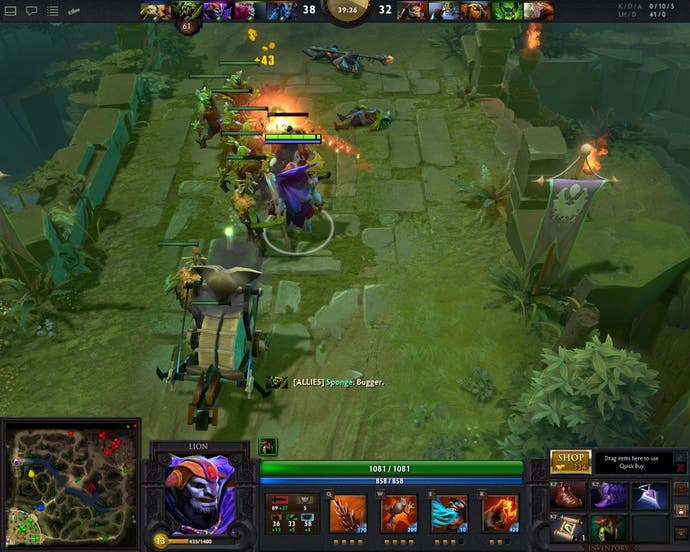
I'm quite used to offensives remarks from online players, but I forgot how emphatic and particular the Dota community is. One player tells me that he can deal with me not being an expert at the game, but that I shouldn't have momentarily left my PC to answer the door and I need to "minimise" such things in future. I'm not quite sure what to reply.
I do know that I don't immediately fancy having to once again become intimately familiar with the features and foibles of dozens of different characters, in a game where mistakes can cost matches and where abuse and intolerance are commonplace. There'll have to be something a little bit special on offer to tempt me back to that particular fracas.
With this game, Valve's real challenge has never been technical - it's been psychological. When Dota 2 goes live, the important question will not be what kind of game you are playing, but instead who you are playing it with.
